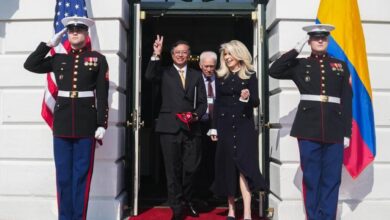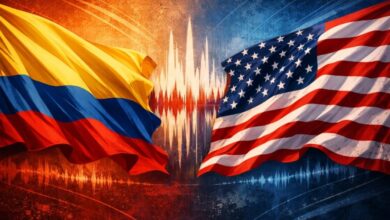One Year After the National Strike in Colombia: How Does This Situation Affect the Politics of 2022?
On April 28, 2021, one of the most extensive and violent demonstrations in the recent history of the Andean country began. In addition to the social and economic crisis that it triggered, the situation also marked a route plan for this year's presidential elections. We analyze how the National Strike has affected the presidential elections in Colombia.

Photo: Flickr-Oxi.Ap
LatinAmerican Post | Christopher Ramírez Hernández
Listen to this article
Leer en español: A un año del Paro Nacional en Colombia: ¿Cómo afectan las manifestaciones a la política del 2022?
Between April and June 2021, Colombia was plunged into a political and social crisis unprecedented in recent years. The so-called National Strike took to the streets of the country. According to figures from the Institute of Studies for Development and Peace (Indepaz), the strike left a balance of 80 people killed in the framework of the protests, mostly at the hands of the authorities. Likewise, this organization reported the death of three members of the public force, as well as one of the Technical Investigation Corps of the Attorney General's Office (CTI).
However, beyond the figures of violence left by this strike, the truth is that the two months it lasted have manifested itself in almost a year of political consequences that today could define the future of the country. On May 29, electoral elections will be held to decide who will be the new president of Colombia, and the consequences of the protests in 2021 could define the winner of this contest.
Initially, the strike began due to the indignation generated in the unions of workers and students, among other social groups, by the bill, announced by the national government in April of last year, which was intended to create a tax reform. According to the opponents, this new norm would negatively affect the pockets of the middle class by creating new taxes, with the excuse of helping the country's economic reactivation.
You may also be interested in: Colombia: What Is The Petro Clause?
Will the Consequences of the Strike Place a New President in Colombia?
However, as the months went by, social indignation gradually became a political truth whose first and greatest beneficiary was the Pacto Histórico, a coalition headed by the current presidential candidate, Gustavo Petro. The leader of the left took advantage of the social indignation generated by the protests in the main cities of the country to generate good revenues, not only in order to try to win the Colombian Presidency but to position his community as one of the most represented in the Congress of the republic.
On March 13, legislative elections were held in Colombia in which citizens voted for their new senators (Upper House) and representatives to the House of Representatives (Lower House), for the period 2022-2026. The Pacto Histórico became the great surprise (or not) of these elections, with 19 seats, out of 102, in the Senate (after the final count of votes by the Registrar) and 25, out of 165, in the House of Representatives.
For many, the overwhelming victory of the left and center-left coalition was almost expected, taking into account the popularity achieved by Petro after the National Strike. It should be remembered that since the demonstrations, each and every one of the surveys carried out has placed him as the number one candidate in the voting intention of Colombians.
This popularity, for example, is reflected in the votes that the Pacto Histórico obtained in the three main towns (districts) of Bogotá during the protests in 2021: Kennedy, Suba, and Usme. For both the Senate and the Chamber, the citizens of these towns, the most active during the strike, demonstrated at the polls to vote for the left and thus defeat right-wing groups such as the Center by more than 70,000 votes. Democratic, led by former President Álvaro Uribe.
Thus, this also shows that another of the impacts of the strike was the increase in the unfavorability of Uribism in Colombia. This political force that has led Colombia for most of the last 20 years has seen a drop in favor among the people, especially due to the ill-advised actions of President Iván Duque, who had himself elected through this political group.
According to a survey conducted by Invamer Poll, Uribe ended 2021 with a favorability rate of just 19%, the lowest in the last 26 years. Likewise, the disfavor that the former president has among Colombians is 67%, while in May of last year it reached a historical peak of 73%, precisely during the moment of the greatest effervescence of the National Strike.
Perhaps, taking these results into account, the former president decided to separate himself a little from these presidential elections, in which his party, for the first time in three elections, will not have a direct candidate. However, his support will focus on the candidate of the Equipo por Colombia coalition, Federico Gutiérrez.
The former mayor of Medellin has accepted the approval of the majority of Uribismo, which sees him as the only candidate who can defeat Petro at the polls. According to 'Fico', his left-wing opponent has taken advantage of the social demonstrations in Colombia to seize “demagogic and populist processes” of the Colombians' intention to vote. For the right-wing candidate, fighting Petro's "threat" to democracy is an obligation, rather than an option, which he precisely raises in his government plan.
According to Gutiérrez, it is extremely important that Colombians believe in democracy again, since according to his program, "our (Colombian) democracy is one of those that receives the least support from citizens, barely 43 percent, according to Latinobarometer 2021”.
In addition, he explains that this is the direct responsibility for problems such as security and corruption, positions that he promises to confront while fighting at all costs to prevent "the emergence of populist and authoritarian voices willing to undermine it" from having greater force.
In short, the 2021 national strike in Colombia has left its mark today in the country with a strengthened left, weakened Uribismo, and the right with the need to once again convince citizens and counteract Duque's mistakes.





